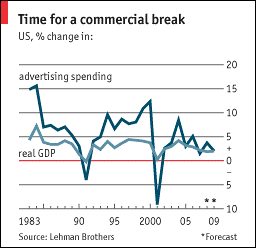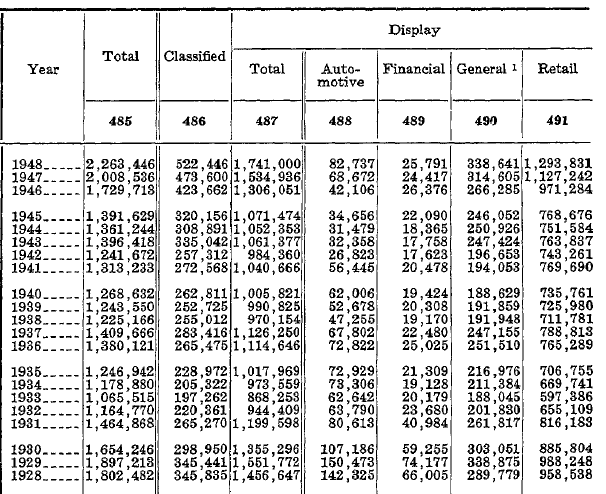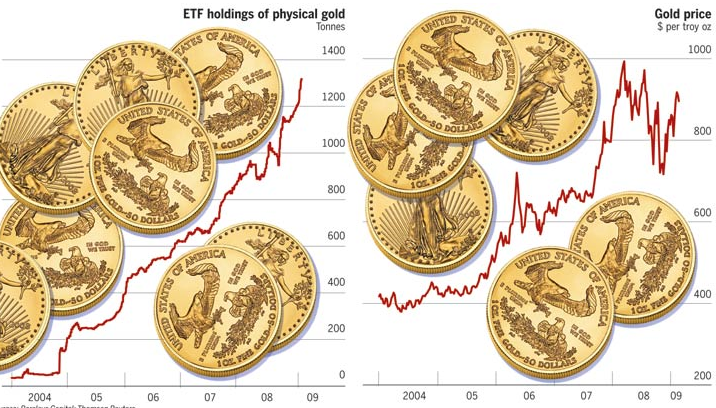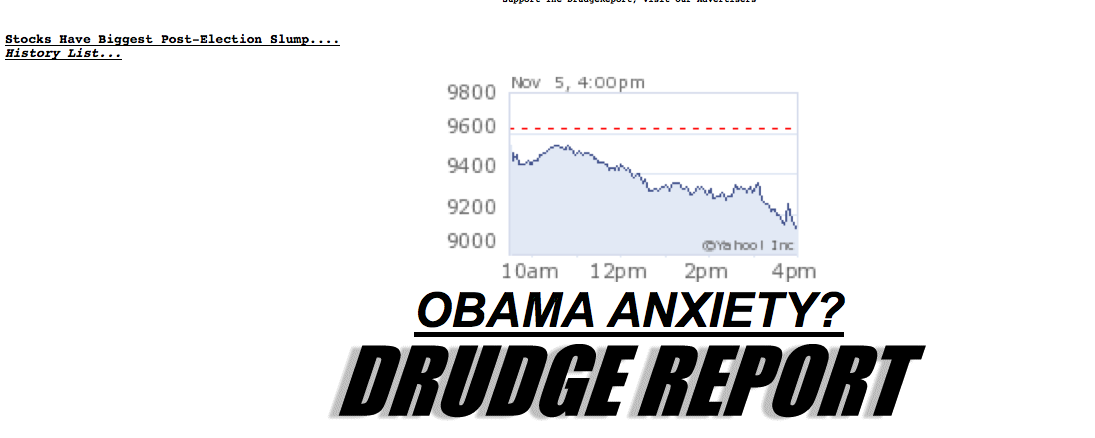Earlier this week Nick Denton suggested that “from conglomerates to internet ventures, executives should be planning now on a decline of up to 40% in advertising spending during this cycle.” He was quoted as saying “Anyone who isn’t prepared for ads to go down 40 percent is crazy.”
Crying wolf?
Some think Denton is crying wolf, trolling for links. One biz journalist told me, “even in the Great Depression, when GDP fell 50% and unemployment reached 25%, advertising only fell by 50%.”
Unfortunately, I think Denton’s got it right. (Mostly.*) Even mild downturns can devastate the ad industry. During the recession of 2001, when GDP turned barely negative for a couple of quarters, ad spending dropped nearly 10%.

And in the first year of the Great Depression, when GDP fell by 10% and unemployment went from 3.2% to 8.7%, newspaper ad lineage dropped by 29%. But that’s just a raw count of ad space, not dollars spent, so the figure doesn’t account for the discounts and freebies that were surely rampant in a market turning from boom to bust. So, in real terms, the decline was more likely on the magnitude of 50 or 60% even in the first “mild” year of the Depression. (Checking newspapers’ books would be one way to see what the real numbers were, but 10 minutes of Googling didn’t turn up anything.)

The Macro Economy turns Micro
Until we see more data and a firm trend line sideways rather than down, we should all err on the side of extreme caution in projecting sales. The macro-economic fundamentals just get uglier with each passing week. The only good news, and it’s a sick flavor of good news, is that banks are not failing. Every other indicator is bleak. In recent weeks, we’ve seen consumer confidence hit an all time low (38, down from 61 the prior month); learned that factory orders were off 2.5% in September, reflecting just half a month’s credit freeze; seen auto sales plunge by 30-40% year over year. We’ve seen countless layoffs at industrial companies, and significant budget cutbacks at media companies like NBC, CBS, Sony. Foreclosures can only go higher as more people get laid off. Over-leveraged under-invested consumers can only increase their savings rate, not consume more.
(I realize this pessimism comes despite the fact that that stock market has traded sideways since September — if you can call oscillating up and down 10% a week sideways. We can ignore the stock market. Most stock analysts and investors, busy looking in their rear view mirrors, are only revising downward past earnings estimates by some fixed percentage, rather than creating entirely new valuation models to take into account how radically maimed the economy is. Anyone buying now thinks the average stock is cheap relative to last year’s prices, rather than understanding that today’s price is expensive relative to next year’s dividend cuts and potential bankruptcies.)
It’s clear that the post-bubble economy will be far tougher and weirder than any of us have ever experienced. In theory, Internet advertising will not be hurt as much as other mediums because it cheaper and more measurable. But advertising, whether online or not, is a discretionary budget item and therefore extremely easy to eliminate in a downturn. The reality is that when agencies fire whole teams and clients put all ad buys on hold, every media company will suffer.
There’s always lots of noise in measuring a sales pipeline. Total contract signings per month fluctuate up and down. Individual deals are so heterogeneous it’s impossible tell whether a delayed order or hearing “the budget was cut” is signal or noise. And it’s hard to know whether the individual buyers we know lose their jobs just because of normal turnover or because their entire division is undergoing a mandatory downsizing. But, viewing all the data together, we know everyone is experiencing a dramatic slowdown.
In short, Nick’s 40% sounds entirely reasonable to me. And 60% seems possible. Most importantly, 15-20%, the current “extreme” position for media analysts, seems unlikely.
The future for blogs and Blogads
The good news for indy bloggers and Blogads: our competitors — with higher overheads, less skin in the game, higher turnover and less devotion to the connecting advertisers with bloggers — will suffer more than we. Eventually, as competitors like NYTimes, TMZ, HuffingtonPost, OMG, Buzznet, TheAtlantic, Blogher, People, Myspace, Newsweek and Glam fold, scale back or lose their staff to greener pastures, ad buyers will spend more than ever with indy bloggers and Blogads.
But this will come only later in the game, after everyone has bled for a while and many have fallen. What should we do in the meantime? At a corporate level, we’re conserving cash to ensure a cushion against the bleak times ahead. While we’re looking for places to economize — evening leaving the corporate jacuzzi unheated — we’re also still expanding. On the programming side, we’re continuing to create new tools and products that will help advertisers and bloggers. And on the sales side, we’re putting even more resources into building relationships with current and potential clients. We see small pockets where there’s potential for tremendous growth next year, and we’re busy working to capture those opportunities. Our staff get annual bonuses rather than monthly commissions, which means we’re each incentived to invest in relationship-building even when sales volumes fall or good contacts lose their jobs temporarily.
Overall, I’m confident that we’ll gain market share and mind share during the downturn, and that we’ll be positioned to pillage and plunder when the economy turns.
* Denton is wrong to fret about political advertising. More on that another day.

![[Most Recent Quotes from www.kitco.com]](http://www.kitconet.com/charts/metals/gold/t24_au_en_euoz_2.gif)



